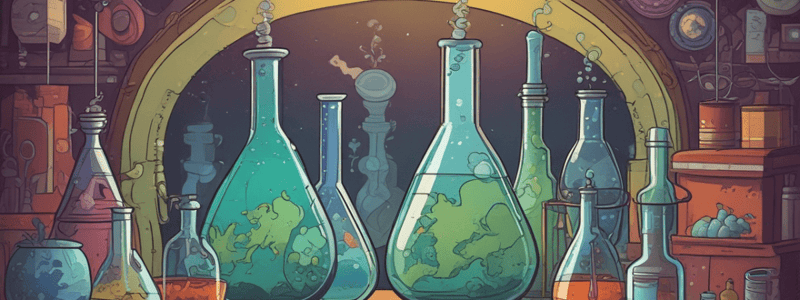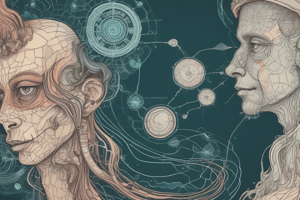Podcast
Questions and Answers
What is the main goal of a science experiment?
What is the main goal of a science experiment?
- To measure the dependent variable only
- To find the cause-and-effect relationship between variables (correct)
- To prove that a hypothesis is always correct
- To change as many variables as possible and observe the outcome
What is the independent variable in an experiment?
What is the independent variable in an experiment?
- The variable that is not related to the experiment
- The variable that is being measured
- The variable that is being changed (correct)
- The variable that is kept constant
Why is it important to keep everything else constant in an experiment?
Why is it important to keep everything else constant in an experiment?
- To ensure that the experiment is done quickly
- To make the experiment more expensive
- To ensure a fair test and accurate results (correct)
- To make the dependent variable change
What does the accuracy of data refer to?
What does the accuracy of data refer to?
What would cause all grass-length measurements to be wrong by a certain amount?
What would cause all grass-length measurements to be wrong by a certain amount?
What is reproducibility of data also known as?
What is reproducibility of data also known as?
Why might the data be less accurate in an experiment?
Why might the data be less accurate in an experiment?
What is the main difference between the two sets of measurements in the example?
What is the main difference between the two sets of measurements in the example?
What does the graph of precise data show?
What does the graph of precise data show?
What does accuracy refer to in the context of measurement?
What does accuracy refer to in the context of measurement?
Why might the data about the amount of water that fell on the grass not be accurate?
Why might the data about the amount of water that fell on the grass not be accurate?
What is the main purpose of taking multiple measurements of the same thing?
What is the main purpose of taking multiple measurements of the same thing?
What is the difference between the two graphs shown?
What is the difference between the two graphs shown?
What does reproducibility refer to in the context of measurement?
What does reproducibility refer to in the context of measurement?
Which of the following would make the data more precise?
Which of the following would make the data more precise?
Flashcards are hidden until you start studying
Study Notes
What is a Science Experiment?
- A science experiment is a systematic method to figure out the structure and behavior of the world.
- It involves changing one variable (independent variable) and observing its effect on another variable (dependent variable).
- Everything else must be kept the same to ensure a fair test.
Example of a Science Experiment
- Investigating how the amount of watering affects the height of grass.
- The amount of water used is the independent variable, and the height of the grass is the dependent variable.
- Other factors like sunlight, soil, and location must be kept the same.
Accuracy of Data
- Accuracy refers to how close to being correct the data is.
- Inaccurate data can occur due to measurement errors or uncontrolled variables.
- Examples of inaccurate data include measuring from the edge of a ruler instead of the zero line, or not accounting for external factors like rainfall.
Reproducibility or Precision of Data
- Reproducibility, or precision, refers to how close together the measurements are.
- It is different from accuracy.
- A high level of precision means that the measurements are consistent and close together.
Examples of Precision
- Measuring the length of grass multiple times to ensure accuracy and taking an average of the numbers.
- Using high-tech equipment to measure variables, such as a water collector that measures to the nearest milliliter.
- Precise data appears as data points close to the best-fit line on a graph.
Comparison of Accuracy and Precision
- Accuracy refers to how correct the data is, while precision refers to how similar and close together the data is.
- Data can be accurate but not precise, or precise but not accurate.
- Both accuracy and precision are important in science experiments.
Studying That Suits You
Use AI to generate personalized quizzes and flashcards to suit your learning preferences.




